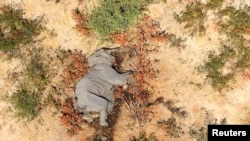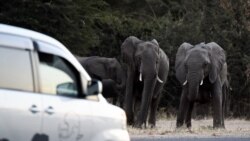Botswana’s government says it expects more test results in the upcoming weeks to determine the cause of the mysterious deaths of hundreds of elephants.
Conservationists first noticed scores of elephant carcasses in May when surveying the vast Okavango Delta Panhandle. Officials in Botswana verified 281 elephant deaths, although some estimates have the total above 350.
In a search for answers, Botswana’s government sent samples to numerous countries for testing, including the United Kingdom, Canada, the United States, South Africa and Zimbabwe.
Authorities in Botswana’s capital Gaborone said they received test results from Zimbabwe, but are reluctant to publicize the findings before obtaining additional results.
“To increase our confidence levels, we need another set of results to corroborate what we have received so that we can rest assured that whatever we are communicating to the public has been properly verified scientifically,” said Oduetse Koboto, the Wildlife Ministry’s permanent secretary.
Poaching, which has historically posed a serious threat to Botswana’s elephant population, has been ruled out as a potential factor since the elephants were found with their tusks intact.
After two months since the initial discovery, Botswana is facing criticism for its slow progress in investigating the elephant deaths. Authorities have cited COVID-19 restrictions as a primary reason for the delay.
One local conservationist commended recent efforts to accelerate the investigation.
“It is good that the government is becoming a little more transparent with where they have sent [samples] and what they are looking for in each place,” said Neill Fitt, former chief executive of the Kalahari Conservation Club.
“It is a good thing that they are spreading it wide to try and get the best result possible," he said.
Botswana is home to the largest elephant population in the world with around 130,000 elephants.
The government has reportedly begun removing tusks from the elephant carcasses.
No new carcasses have been reported since last week.

